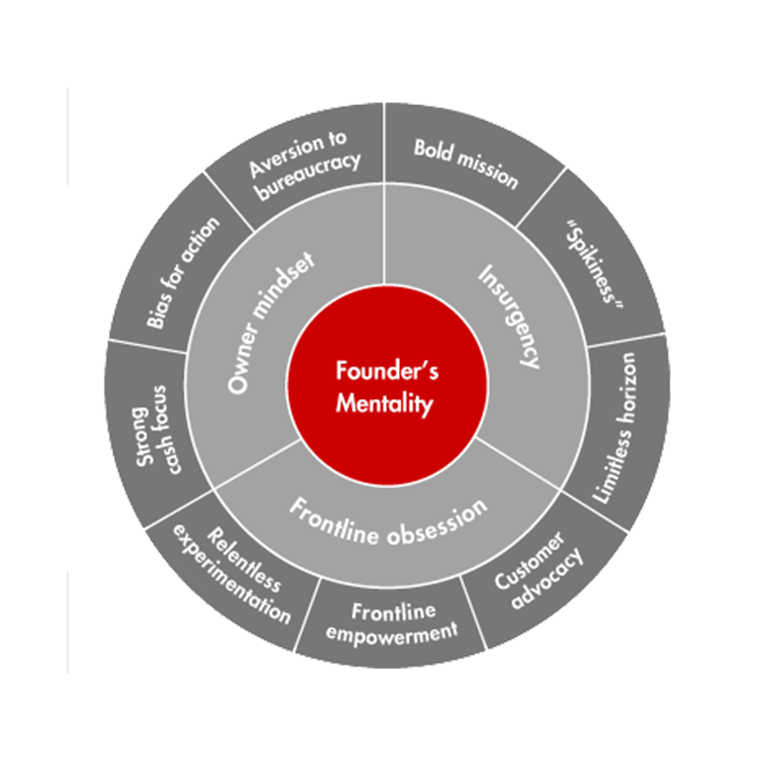Founder's Mentality Blog
Over the summer, I wrote a blog post called “The bigger we get, the smaller we think,” focusing on the tendency of founder-led companies to narrow their aspirations as they grow. Instead of continuing to think big, they begin to think smaller. Instead of seeking to redefine their industries on behalf of an underserved customer, they begin to measure themselves against the standards set by industry incumbents.
In the months since, we’ve come across a variant of this phenomenon we’ll call “The bigger we get, the more generic we become.” More specifically, as companies grow, their vision, mission and values statements all begin to sound the same. It’s a problem that can plague any company, and it isn’t just a matter of words—the bigger companies get, the more they tend to lose strategic focus, the less they celebrate what makes them different and extraordinary, and the more they aspire to be like everyone else.
Here’s some context: In one recent discussion with a group of founders, we got onto the topic of mission statements. It was clear that a number of them had just gone through internal processes to write a new mission or vision statement, or to put together a list of company values. We asked some of the founders to read their statements aloud and most had one thing in common—they had absolutely nothing to do with the company each founder had created. The mission statements were wonderful collections of generic business aspirations, but they were neither unique nor particularly relevant to the extraordinary companies represented in the room.

About the Founder's Mentality
The three elements of the Founder's Mentality help companies sustain performance while avoiding the inevitable crises of growth.
Most talked about creating a delightful customer experience. Many talked about being the best place to work. A couple talked about creating a better future. Somehow, as these extraordinary founders were working to take their companies to the next level, they had started to think smaller. They began to embrace the generic, rather than grab hold and jealously guard the unique, quirky and insane attributes of the actual companies they had created.
One of the founders in the room, for instance, had created a truly superior retail company. It had transformed its market with a sharp focus on product safety and a new standard of supply-chain integrity. These standards ran through the company founders’ veins. They were light years ahead of what the rest of the industry was delivering or the customer was expecting. Yet they were completely absent from a company mission statement that was instead a lukewarm summary of five beautiful aspirations for a generic business. I simply couldn’t understand that, and said so. The founder explained that everyone understood the supply chain imperative—the founders hammered on this point every day—but the mission statement needed to be broader, to reflect the aspiration to be a world-class business where everyone would be proud to work.
I love this founding team. They are among the most extraordinary leaders I’ve ever met. But my response to this was “poppycock” (we had fun with the translation of that one). Why would they abandon what really matters in their mission statement to create a “well-rounded” list of business phrases? No leadership team on Earth could write an edgier, bolder or more transformative mission statement about supply-chain integrity. The founders had the unique opportunity to help carry their revolution forward. Instead, they abandoned what made the company distinctive in favor of a set of words and phrases that could apply to 90% of companies. Why?
A second company was a leading manufacturer of fashion apparel. The founder had an extraordinary vision—he was fighting very hard to lower his growth rate so he didn’t have to force himself to lower his standards on talent. He felt that if he could emerge from this first rapid phase of market growth with his A-team intact, his company would be perfectly positioned for the next wave of growth. And he felt that his competitors were growing too fast and would begin to lose their way as their talent pools were diluted. I’ve never seen a leader so focused on the right kind of growth, picking and choosing his revenue opportunities carefully in order to preserve the quality of his core team. But again, this dogged emphasis on talent was missing from his mission and vision statements. These statements, he said, needed to be created by the full team, and he was reluctant to impose his vision. Really?
Why is it that the bigger we get, the more generic we become? Why is it that we start to define ourselves by the industry rules of the game, by the latest and greatest management phrases, by a set of round-edged messages that dutifully hit all the highlights of customer, employee, shareholder and community focus? Why do we abandon the weird and wonderful elements of our true nature?
The founders ultimately agreed on this point. They recognized that by smoothing out the spikes that define their greatness, they were encouraging their organizations to think smaller and rein in their insurgent energy. What these companies have before them is a fantastic chance to lock in the insurgency and define themselves by what makes them unique. But that’s not achieved by creating a checklist of attributes that could be chapter headings of any business book.